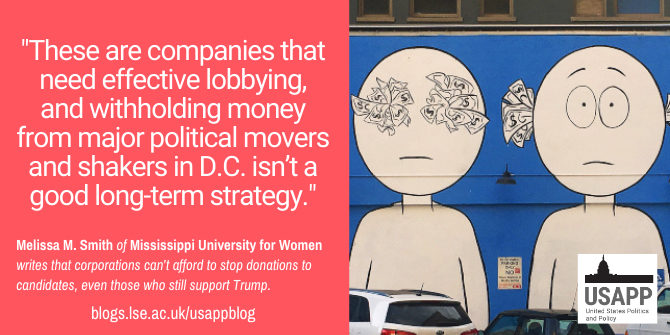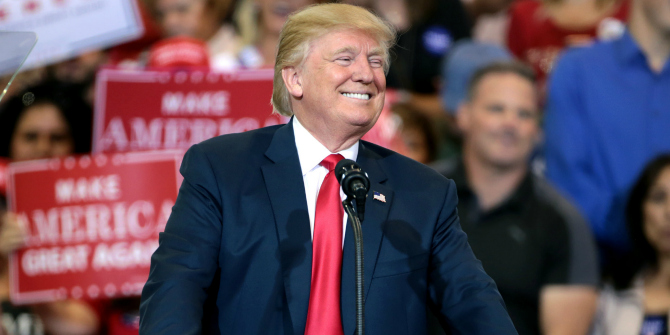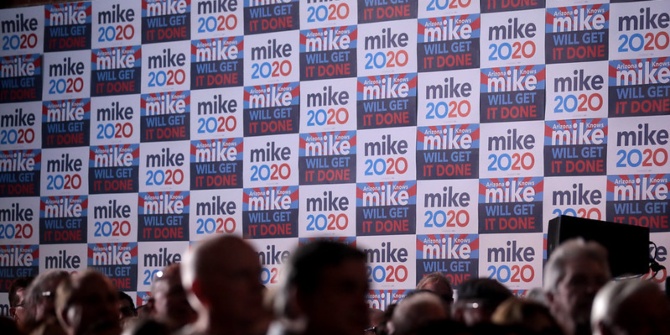 After the January 6, 2021 US Capitol insurrection, many companies stopped their donations to candidates who supported President Trump and other enablers of the attack. Melissa M. Smith writes that the need for effective lobbying by these companies means that these donations were only paused. As we head into a midterm election year, and with campaign finance reform still mostly stalled, large companies now face the dilemma of whether to back Trump and his supporters in their own interest, or potentially lose their influence in Washington DC.
After the January 6, 2021 US Capitol insurrection, many companies stopped their donations to candidates who supported President Trump and other enablers of the attack. Melissa M. Smith writes that the need for effective lobbying by these companies means that these donations were only paused. As we head into a midterm election year, and with campaign finance reform still mostly stalled, large companies now face the dilemma of whether to back Trump and his supporters in their own interest, or potentially lose their influence in Washington DC.
The sight of Americans pouring into and ransacking the US Capitol on January 6, 2021 seems to have had only a temporary impact on contributions to federal political coffers. In the wake of the Capitol insurrection, Dozens of companies that regularly donated large amounts of political action committee (PAC) money to parties and individual candidates vowed to “reassess” the flow of cash to those House and Senate members who denied the results of the 2020 presidential election. However, the cash seems to be flowing again.
The Public Affairs Council, a non-partisan association for public affairs professionals, reported in December 2021 that 80 percent of corporate PACs paused their contributions following the events at the Capitol. For some of the companies that were trying to exercise a greater corporate social responsibility, what followed was a re-thinking about their criteria for candidates who would receive donations. But for others, there was a three-month pause in donations that was, as the Washington Post termed it, “mostly symbolic”. That’s because the months following a national election are traditionally slow ones for PACs anyway, since they have just divvied up most of their funds.
Companies need for lobbying has meant only a short pause in donations
Whether the pause was instituted because of actual concern with those supporting former president Donald Trump’s assertion that the election was “stolen,” or whether it was simply a way for a company to look responsible to the public, few people thought it would be indefinite. After all, these are companies that need effective lobbying, and withholding money from major political movers and shakers in D.C. isn’t a good long-term strategy.
For instance, let’s look at three companies identified in a CNBC story as having resumed donations to lawmakers who supported Trump’s claims. One is Boeing, which is the world’s largest aerospace company. In addition to commercial aircraft, the company builds military aircraft, satellites, and contracts for engineering and training on its products. According to Forbes, it accounts for 21 percent of the US Department of Defense’s procurement budget. One might imagine that handing out political donations and lobbying for contracts would be an important part of the company’s business.
Raytheon was another company that initially said it would pause its campaign contributions to all federal candidates after the events at the Capitol. It is a major defense contractor that works with cybersecurity, artificial intelligence, advanced propulsion, and defense electronics. It is also one of the top contractors of the US federal government. According to OpenSecrets.org, Raytheon spent more than $4 million on lobbying in 2019. It also donated more than $3 million through its PAC in the 2019-2020 election cycle, with a slight majority of the funds going to Republican candidates. Once again, completely halting political donations would probably not be in the company’s best long-term interest.
Another company that temporarily halted political donations was General Motors. It is the largest automobile manufacturer based in the United States and has several government contracts, including one announced in 2021 for the development of new, heavy-duty vehicles for the US State Department’s Diplomatic Security Service. The company retains more than a dozen lobbying firms, and it employs at least seven in-house lobbyists. Stopping the flow of cash to political candidates was destined to be a temporary measure for GM.

“Citizens United by Kai” by wiredforlego is licensed under CC BY NC 2.0
All three of these companies resumed political donations in 2021, with some money going to Republicans who allied with Trump in his objections to the 2020 election. Although the amounts are smaller than had been donated in the past, it’s easy to be somewhat cynical about the ulterior motives of large companies such as these that have important financial ties to the federal government.
Companies face a dilemma as we approach the midterms
Of course, the real test will be how much money is donated to federal candidates in the 2022 midterm election — and who receives it. As candidates for House and Senate races are gearing up for primaries and elections, companies will have to decide how much they should allocate to Trump supporters. While the GOP as a whole might want to push the January 6 insurrection and Trump’s claims out of the limelight, many Republicans still publicly agree with the former president, and he is one of the party’s biggest fundraisers. This creates a conundrum for companies and their political donations.
Many companies donate to both Republicans and Democrats — which makes business sense — and PAC donations to the national parties are quite common. However, the Washington Post story noted that 20 percent of Fortune 500 companies made at least one contribution last year to one of the 139 House members who supported Trump. That is a low number, but we are moving into an election year, and it will probably increase.
It is worth noting that changes in corporate PAC donations have probably made more of an impact on campaign financing than former candidate Joe Biden’s pledge to overhaul money in politics. During his 2020 presidential campaign, he had a 10-point pledge regarding campaign finance overhaul that included, among other things, introducing a constitutional amendment to require federal candidates to use only public campaign funds, moving to restrict SuperPACs, increasing transparency of election spending, working to ban corporate PAC contributions to candidates, and prohibiting lobbyists from donating to those whom they lobby.
The role of money in politics is here to stay
While there are understandably larger challenges in the country right now, as of yet, campaign finance reform has not been a top priority for the administration. In December 2020, the Senate confirmed three new members to the Federal Election Commission, giving it enough commissioners to finally meet again. It had gone most of 2020 — an election year — without being able to take enforcement actions because it did not have a quorum.
In a report outlining challenges to the agency in 2022, it was noted that there has been “explosive growth” in the number of transactions reported to the FEC during each election cycle. In fact, the number of financial transactions received by the agency in October 2020 alone was more than all those received during the entire 2016 election cycle.
It is obvious that the role of money in politics isn’t going away, and it isn’t decreasing, either. This places more importance on the decisions made by corporations and organizations handing out PAC donations to federal candidates. In many respects, these big donations provide the foundation for political campaigns. Without large infusions of PAC funds, many campaigns falter and run out of cash. As we move into the 2022 midterm election cycle, it will be interesting to watch the flow of money and see if it returns to those who stood — and still stand — with Trump, or if it will go to other candidates. These decisions could help determine the future of those who are elected to Congress and the White House.
Please read our comments policy before commenting
Note: This article gives the views of the author, and not the position of USAPP– American Politics and Policy, nor of the London School of Economics.
Shortened URL for this post: https://bit.ly/3nAdBzP
About the author
 Melissa M. Smith – Mississippi University for Women
Melissa M. Smith – Mississippi University for Women
Melissa M. Smith is a Professor of Communication and Gibbons Chair of Journalism at Mississippi University for Women. Her research focuses on US elections, and her work has appeared in several journals. She is the co-author of two books, Campaign Finance Reform: The Political Shell Game, and Dark Money, Super PACs, and the 2012 Election, both of which were published by Lexington Books. Her latest book, Third Parties, Outsiders, and Renegades: Modern Challenges to the Two-Party System in Presidential Elections, is also published by Lexington.






